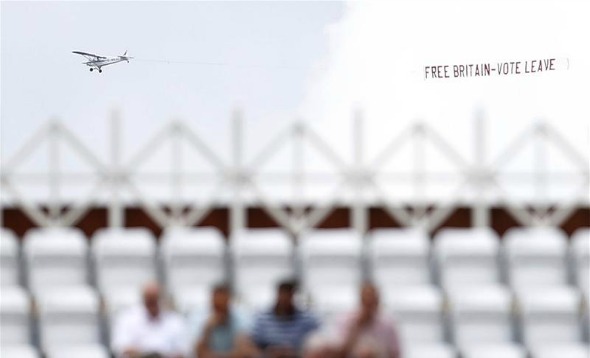Just How Bad is Brexit for British Sport?
June 24, 2016
Not even the combined entreaties of sporting luminaries including David Beckham, Arsene Wenger, Karren Brady and Bobby George could prevail on the British public as it was revealed this morning that we – that is the collective we – have voted out.
With the pound plummeting, the PM resigning and the rest of us wondering what on earth happens next, what does this mean for British sport?
The more hopeful among the football fraternity have claimed that this is the chance to redress the club and country balance for England since the freedom of movement principle could radically change work permits. Certainly around 100 EPL players could potentially be affected, as would 70 cricketers and a similar number of rugby players across England, Wales and Scotland. Regardless of the exit terms it is highly unlikely the Home Office would withdraw permits from those who already have them, but it would mean if restrictive measures were put in place, the next generation of Kantes and Payets, Strausses and Pietersens, and Tuilagis and Vunipolos would not be plying their trade on British soil, let alone represent ‘their country’.
Trading with EU countries is another issue affected by freedom of movement; it could well be that the UK now has the freedom – or the requirement – to set up trading agreements with any country with whom we wish to trade. The period during which these are being determined could see new import and export tariffs being imposed. That can only be bad news for the UK consumer.
Sponsorship is another pillar of British sport and when we look at the numbers of foreign-owned brands investing here, it is a worry as to whether they will continue. Chevrolet, Emirates, Yokohama, Mitsubishi, Investec and HSBC are all high profile sponsors who have demonstrated multimillion pound commitments, all of whom may be wondering whether a British property, with reduced European leverage, remains of equal interest and value. Especially worrying in this line up are the banking brands; if the naysayers are to be believed, the impending mass exit of financial institutions from London to the continent could well mean that the sponsorship spend goes with them.

At the other end of the scale are the countless number of SMEs which populate the British sports sector; whilst certain ones will find it much harder to trade across borders there is an upside to Brexit – although you do have to look quite hard to see it. EU legislation seems to be created mainly with big businesses in mind yet SMEs still have to comply. A current case in point is the vast overhaul of data protection legislation that came into effect in January. To comply with it fully costs in the region of £10,000 – there aren’t too many SMEs who have the cash or inclination to spend that sort of sum on box-ticking.
Two other areas that have yet to play out fully are the funding Britain receives from the EU for grassroots and broadcasting. Britain would still be eligible to access some of this funding, even as a non-member country so it isn’t all doom and gloom there. There was also pre-exit talk of a digital single market, as proposed by the European Commission; this would end the existing territorial licensing model and enable EU citizens to access content on a pan-European basis but most broadcasters I have spoken to seem to think that it is likely to be business as usual.
So it could well be that in this instance the Premier League has put the situation best in the statement it issued this morning: ‘Given the uncertain nature of what the political and regulatory landscape might be following the ‘Leave’ vote, there is little point second guessing the implications until there is greater clarity.’ In other words, keep watching this space…
 Rebecca Hopkins – Managing Director of ENS Sports PR
Rebecca Hopkins – Managing Director of ENS Sports PR
Rebecca’s company, ENS, is an award-winning PR agency with over a decade of success working with brands, individuals and sports organizations, including BT, Craig Bellamy, VisitEngland, the LTA and Rhino Rugby.
Rebecca’s most recent ventures have been to devise and found The Sports Technology Awards (www.sportstechnologyawards.
Rebecca is a regular TV pundit on the subject of sports business and presents The Sports Marketing Show on iSportconnect; she is a founding partner of the Sports Reputation Group, a guest lecturer for CIM, she serves on the National Council of the PRCA and she has judged several industry awards, including the PRCA awards and the Football Business Awards.


